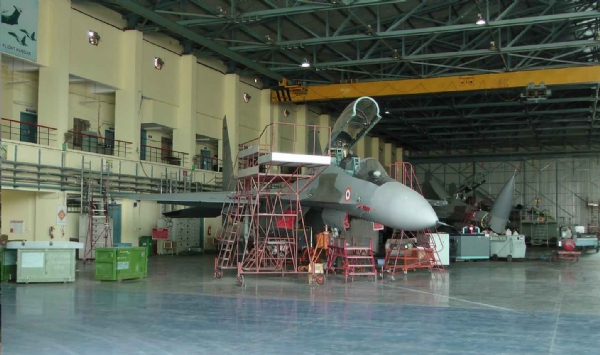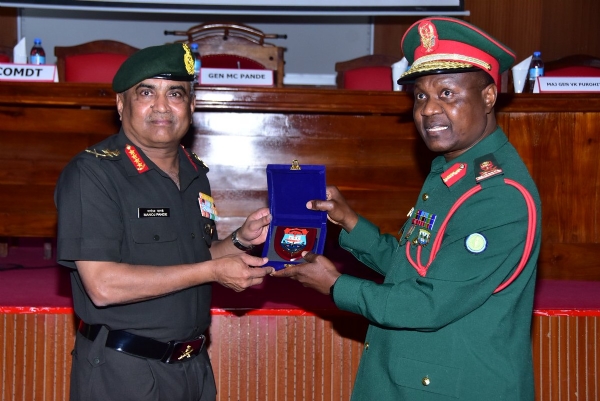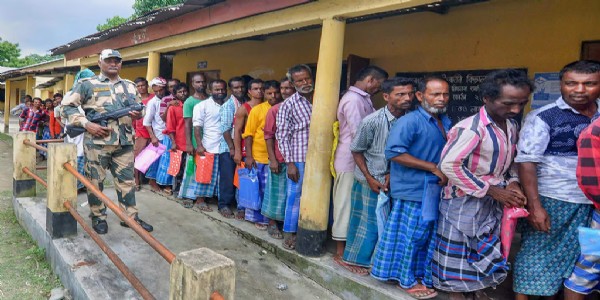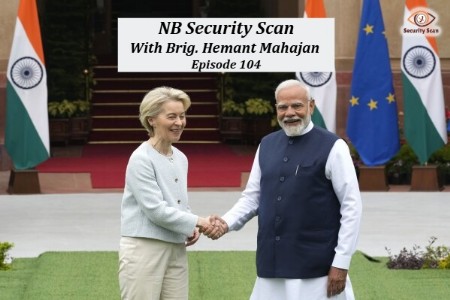#SecurityScan 61: Hamas's attack on Israel, NIA arrest of MOST WANTED Shahnawaz and much more
China spurned Pakistan"s proposals for new Belt and Road projects Meeting minutes reflect Beijing"s concerns over political instability, security
Total Views | 205
This article is a summary of important events that have taken place in last one week affecting, India's national security
Hamas Israeli War-In Brief
Strike by Hamas seems to have broken the Orwellian myth of superior Israeli Intelligence. Along with it, Hamas seems to be doing better than last time, indicating progress in their learning curve(use of Para gliders, taking hostages, and retreating).
Hamas no longer restricted itself to building strongholds in Gaza, but sensing an opportune time to attack Israel is something worth noting.

Iron dome, Border fence, and all other sensors are means to an end, but not the end in itself. A house cannot defend itself, and the buck stops at Netanyahu, he needs to tread carefully, otherwise, it will impact Arab-Israel normalization and IMEC. India also needs to be cautious about how it will secure its trade if tomorrow Hamas chooses to expand its reach and hits Haifa.
This conflict also breaks the myth that no amount of economic incentive can change hearts and minds unless it is organically developed.
The Israel Defense Forces is gradually deploying ground troops and transferring additional forces from the east of the country, but it has not yet been possible to stabilize the situation.
The gradual thawing of Israel’s relations with its Arab neighbours had raised hopes of building a “a new Middle East”, where economic cooperation leads to a shared prosperity. But with its surprise attack on Israel over the weekend, the terror group Hamas looks to have pulled the rug from under this ambitious peace-and-business endeavour. The scale of the attack has shocked Israelis deeply and in this sense its description as Israel’s 9/11 moment is logical. But it came by both air and land and hit many cities simultaneously. Netanyahu’s grim declaration, “We are at war,” was a natural follow-up. Where this war will go is difficult to predict. What is certain is that given how steadfast a security partner Israel has been for India, today India stands steadfast by it.
Magnificent 107-Build on momentum provided by Asiad success
BREACHING the 100-medal barrier at the Asian Games is a landmark moment for Indian sports. Achieving the ‘Iss baar 100 paar’ goal is no mean feat. The haul of 107 medals surpasses by a huge margin the previous highest tally of 70 at Jakarta five years ago. Finishing fourth overall, it is India’s best performance in 60 years. The previous highest ranking was in 1962, when India finished third. The significance of the march to a century is not limited to numbers. The preparedness of the athletes, their confidence and the self-assuredness on display augur well for India’s sporting ambitions. The players, the coaches, the support staff and the authorities deserve all the credit.
Two years ago, India had registered its best-ever haul at the Olympics, winning seven medals in Tokyo. The signs of change are hard to miss. The results of increased funding, focused training and exposure trips abroad are showing. It’s a welcome break from the perpetual complaints of lack of infrastructure and support. The Central and state governments have done well to back the athletes and invest in sporting infrastructure. It is essential to build on the momentum. The level of competitiveness on the global stage does not allow any room for complacency.
A 650-strong contingent for the Asian Games has sent an encouraging message that every athlete, playing whichever sport, is valued. The decision has been validated by the record number of women podium finishers and medals in disciplines in which India has had little or no presence.
Amid the success, it would be prudent to reflect on the inadequacies. At Hangzhou, hosts China bagged 383 medals, including 201 gold. The distance to cover is vast. India has the talent, but the challenge is to tap it. Nurturing a sporting culture requires sustained investment.
External Security
One of NIA's most wanted terrorists Shahnawaz arrested with two associates
All three have done engineering. Citing preliminary questioning, the police said the accused recced various areas in western and southern India. They wanted to make their base in Western Ghats, the police said. Shanawaz had escaped from the custody of Pune Police and was living in Delhi, they said. He carried a reward of Rs 3 lakh. Elementary plastic tubes, iron pipes, different types of chemicals, timing devices, etc, which could have been used in making explosive devices, were seized from Shahnawaz, along with a pistol and cartridges, the police alleged. Read more
Another Lashkar-e-Taiba terrorist killed in mysterious shooting in Karachi, Pakistan
Unidentified gunmen in Pakistan have killed another key Lashkar-e-Taiba operative, Mufti Qaiser Farooq, in a targeted attack in Karachi. The motive behind the assassination remains undisclosed, but sources suggest that internal strife within the group may be responsible. The attackers' familiarity with the area suggests insider involvement. This incident follows a series of killings of religious clerics associated with terrorist organizations.
Indian Navy to unveil new Autonomous boat swarms and AUVs at Swavlamban seminar
India is gearing up for the second edition of the Naval Innovation and Indigenization Seminar, which will showcase groundbreaking developments including Autonomous Weaponized Boat Swarms and Autonomous Underwater Vehicles (AUVs). The Indian Navy has partnered with Sagar Defence Engineering Pvt. Ltd for the advancement of the boat swarms, and has also procured 30 AUVs from the company.
IAF mainstay Su 30MKI fighter jet fleet to be upgraded under ₹60,000-crore plan

Sources said the upgrade plan is valued in excess of Rs 60,000 crore and will touch all aspects of the fighter jet except for its airframe and engines. Hindustan Aeronautics Limited (HAL) will be the lead agency for the upgrade in partnership with the Indian Air Force and other partners. India ordered 272 of the fighter jets from Russia that form the mainstay of the air force fighter fleet
After 200 raids, Delhi Police arrests 3 suspected ISIS terrorists who hold NIT Btech degree and PhD from Jamia
Delhi Police's special cell has apprehended a "most wanted" terror suspect, Mohammed Shahnawaz Alam, along with two associates associated with an alleged "ISIS-inspired" module. The police claim that the module was planning high-intensity blasts in key locations in Delhi. The arrest was made after raids in multiple locations in northern India.
Delhi Police's Special Cell has arrested two individuals with expertise in creating improvised explosive devices (IEDs) using common chemicals. Mohammed Shahnawaz Alam, a mining engineer, and Arshad Warsi, a physics teacher and PhD student, were taken into custody for suspected involvement in terror-related activities. The suspects had knowledge of explosives, raising concerns among the anti-terror unit.
Indian Army turns to ancient texts to prepare for wars of the future
The Indian Army, is embarking on a journey to tap into the rich reservoir of ancient Indian wisdom in statecraft, strategy, diplomacy, and warfare to prepare itself for the challenges of the future. This endeavor, known as "Project Udbhav," represents an initiative by the Army to rediscover India's heritage of statecraft and strategic thought as drawn from ancient Indian texts. In collaboration with the United Service Institution of India (USI), the Army Training Command (ARTRAC) conducted its inaugural hybrid seminar under this project, titled "Evolution of Indian military systems, war-fighting, and strategic thought – current research in the field and way forward."
While the project has garnered interest and support, some veterans have raised questions about the applicability of deep rooted Indian strategic concepts in the context of modern and future conflicts. Nonetheless, the Army remains optimistic about Project Udbhav, emphasizing its mission to bridge the historical and the contemporary by delving into India's rich historical narratives in statecraft and strategic thinking. This initiative Agencies aligns with the government's directive to modernize and shed "vestiges of the colonial era" in the armed forces.
Project Udbhav takes a comprehensive approach, encompassing indigenous military systems, historical texts, regional texts and kingdoms, thematic studies, and a focus on the works of ancient strategists like Kautilya. Its aim is not only to rediscover these narratives but also to develop an indigenous strategic vocabulary deeply rooted in India's diverse philosophical and cultural heritage, which can be integrated into modern military education. The project, which began in 2021, has already yielded a book listing 75 aphorisms selected from ancient texts, offering valuable insights into India's strategic heritage.
The recent seminar gathered scholars, serving officers, and veterans to study ancient texts dating from the 4th century BC to the 8th century BC, with particular attention to figures like Kautilya, Kamandaka, and The Kural. Project Udbhav will continue with a series of engagements, including the Indian Military Heritage Festival scheduled for October 21-22. The Army's overarching goal is to equip its officers with the ability to apply ancient wisdom to modern scenarios, fostering a deeper understanding of international relations and foreign cultures in the process.
Army fights enemy that gets support from outside, and strengthens itself internally:
"It needs a lot of courage which the other forces do not have to face. The other forces have skills, experiences and knowledge .
Army Chief Gen Pande begins 4-day visit to Tanzania

Indian Army Chief Gen Manoj Pande is visiting Tanzania to strengthen the military partnership between the two countries. During his four-day visit, Gen Pande will meet top officials, including President Samia Suluhu Hassan and Defence Minister Stergomena Lawrence Tax. The visit aims to enhance bilateral defence engagements and pave the way for a stronger future partnership.
Murder Claim in Canada Is Only Helping India -India’s opposition parties, backs government-Claim bolsters Modi’s strongman image within the country
As the US and its allies fret over Canada’s allegation that India orchestrated the murder of a Sikh separatist leader, the scandal is providing a political boost to Prime Minister Narendra Modi.India has gone on the offensive since Canadian Prime Minister Justin Trudeau accused Modi’s government of orchestrating the murder of Hardeep Singh Nijjar, a priest who advocated for an independent Sikh homeland in India, and whom India branded a terrorist in 2020. While Foreign Minister Subrahmanyam Jaishankar this week said India was open to looking at specific evidence, he blamed Canada for not taking action against extremists.
Countering Chinese Multi domain war
South China Sea: Philippines doesn’t want war but will stand up to China’s ‘bullying’, defence chief says
The Philippines will ‘stand its ground’, especially in light of China’s recent actions in the resource-rich South China Sea, said its defence chief. Philippine lawmakers also rallied behind a proposal to funnel more money into law enforcement agencies tasked with protecting the country’s territorial waters. China-Philippines are sleepwalking toward a sea fight. Philippine Coast Guard has cut China’s floating barrier around disputed shoal while Beijing vaguely threatened South China Sea military exercises.
Evergrande Tycoon Crossed a Red Line When Wealth Funds Ran Dry
China Evergrande Group wiped out international investors, roiled financial markets and left thousands of suppliers in the lurch. Yet it was the developer’s failure to pay households who invested in its wealth management products that may have provided the last straw for Chinese authorities.Almost two years after Evergrande defaulted on its debt, its billionaire founder and chairman, Hui Ka Yan, is under police control on suspicion of committing unspecified crimes. Staff at the group’s wealth management business have been detained. Hui’s son Peter Xu, who once ran the firm’s wealth unit, was also taken into custody.
Japan, Germany to start negotiations on defense cross-servicing deal Talks mark latest step toward deeper security cooperation
Japan will begin formal negotiations with the German government on an agreement that would let their armed forces exchange fuel and other supplies, easing the way for joint drills. The Acquisition and Cross-Servicing Agreement (ACSA) "is expected not only to contribute to Japan's security, but also to help both Japan and Germany make a more active contribution to peace and security of the international community. Japan seeks an early conclusion to the negotiations.
Japan has signed similar agreements with other countries, including the U.S., Australia, France, the U.K. and India.
Foreign investors' net selling of China shares hits 9-year high-Trade via Stock Connect link with Hong Kong sags on property crisis, slowing economy
Foreign investors continue to dump Chinese stocks of companies in mainland China. In the July-September period, they sold 80.1 billion yuan ($10.97 billion) more shares than they purchased through Stock Connect, the trading link between Hong Kong and exchanges in Shanghai and Shenzhen, hitting the largest quarterly net selling since the mutual market access program started in 2014.Concern about the macroeconomic outlook and the real estate problems in China has been prodding overseas investors to unload Chinese shares, especially those of financial institutions and personal consumption-related companies.
Gifts, Gadgets and Greece: Inside a Huawei Lobbying Campaign
Leaked internal messages detail efforts by the Chinese tech giant to court Greek officials and fight an American-led effort against its technology.
China Blocks Executive at U.S. Firm Kroll From Leaving the Mainland
A senior executive at American risk advisory firm Kroll has been barred from leaving mainland China, the latest example of Chinese authorities imposing exit bans on the employees of foreign firms.
German military exports to Ukraine surge fourfold this year
Ukraine accounted for 3.3 billion euros ($3.48 billion) out of Germany's total value of authorized military exports of 8.76 billion euros in the first nine months of the year. By contrast, for the same period last year, 775 million euros' worth of equipment had been approved for Ukraine.
Terror, Inflation, Debt, Receding China: How multiple troubles are paralyzing
Pakistan is currently dealing with challenges like terrorism, receding support from China's Belt and Road Initiative, and surging inflation. In response, Pakistan is reevaluating its alliances, with recent interactions with the US and negotiations with China to reduce project costs. These challenges are shaping Pakistan's foreign relations and internal policies.
US Army is launching a sweeping overhaul of its recruiting to reverse enlistment shortfalls

Army officials, however, said that number still allows the service to meet its required total strength of 4,52,000. They said the Army also signed up an additional 4,600 recruits for future contracts, in an effort to build back the pool of delayed-entry recruits, which had eroded. Those recruits will go to basic training over the next year.
UK companies to design, manufacture AUKUS nuclear submarines
The first of the submarines will be delivered into service in the UK in the late 2030s and the first Australian ones will follow in the early 2040s.
China spurned Pakistan's proposals for new Belt and Road projects Meeting minutes reflect Beijing's concerns over political instability, security
China rejected calls to invest in fresh Belt and Road projects in Pakistan, according to the minutes of a high-level meeting between the neighboring nations, a stance experts chalk up mainly to the political uncertainty and deteriorating security plaguing Islamabad. Two officials who have seen the minutes told Nikkei Asia that the Chinese side turned down Pakistan's suggestions to add more projects related to energy, climate change, electricity transmission lines and tourism under the China-Pakistan Economic Corridor (CPEC) -- the $50 billion Pakistani component of the Belt and Road.
Taiwan cultivates homegrown drone industry with eye on China
Island boosts defense supply chains while fostering new growth driver Taiwan is building up its drone industry, mobilizing the public and private sectors to strengthen its self-defense capabilities amid rising tensions with China, a global leader in the field. Driving the industry's growth is Taiwan's Ministry of National Defense, which plans to spend 50 billion New Taiwan dollars (around $1.5 billion) to acquire more than 3,000 civilian drones -- also known as unmanned aerial vehicles (UAVs) -- for military use by 2028.
--
Bharati Web







